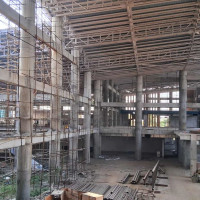- Thursday, 20 November 2025
3% households in Karnali still without toilets
By Lalit Basel,Surkhet, Nov. 20: Although Karnali Province was declared an open-defecation-free zone in June 2018 after toilets were built in all households, a recent assessment shows that 3 per cent houses still do not have toilets.
Around 30 per cent of the toilets that were constructed are also temporary or poorly built and require urgent upgrading.
Speaking at an event organised by the Ministry of Water Resources and Energy Development to mark World Toilet Day, Secretary Mohan Kumar Shakya said that 3 per cent of households in Karnali remain without toilets.
He added that 30 per cent of toilets built during the open-defecation-free campaign are basic or temporary and need immediate improvement. For this, he stressed, communities, development partners and local governments must work together.
He said that meeting the target of making Karnali a fully sanitised province by 2030 is essential. While the provincial government has allocated around Rs. 1.5 billion for drinking water, there is no dedicated budget for sanitation.
Shakya also clarified that the government has no policy of providing household subsidies for toilet construction.
Similarly, the SUSWA project, which works in the sanitation sector in Karnali, reported that one-third of households still need their toilets upgraded.
SUSWA’s sanitation expert, Govinda Rokaya, said that one-third of toilets remain temporary and therefore require immediate improvement. He said the project aims to build 24,000 toilets in 28 municipalities of Karnali, upgrade 12,000 existing toilets, ensure soap availability in 30,000 homes and help 16,000 households meet all sanitation indicators.
UNICEF Nepal’s Katak Rokaya said that although Karnali was declared open-defecation-free nine years ago, ensuring the long-term sustainability of toilets now poses a challenge. Nepal was declared an open-defecation-free country on 13 October 2019.
He said that since the campaign began in 2010, Nepal has built 5.66 million toilets and invested nearly Rs. 75 billion in the sector. Improved sanitation has helped reduce diseases such as diarrhoea, but many toilets now require upgrading. While rural toilets need improvement, urban areas are facing increasing challenges due to unmanaged sanitation.
Bir Bahadur Shahi, chief of the Health Division at the Ministry of Social Development, said the provincial government is promoting sanitation through various programmes. With improved sanitation helping to reduce diseases such as diarrhoea, he said efforts to upgrade toilets must now move ahead with coordination among all stakeholders.














